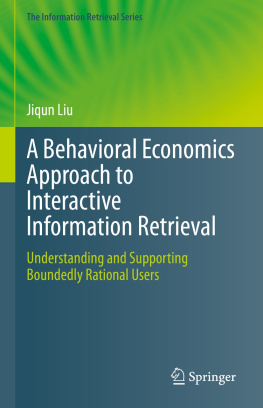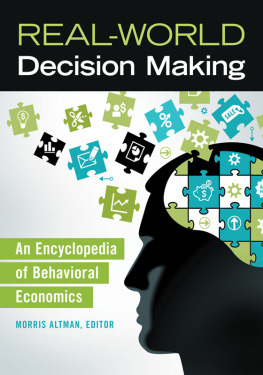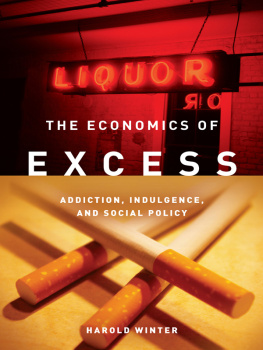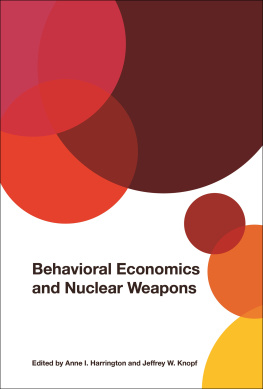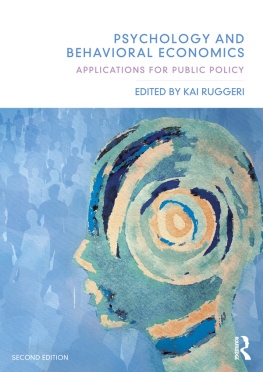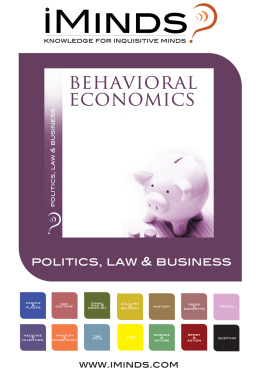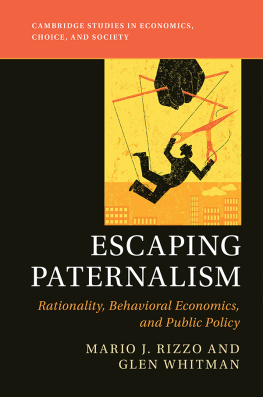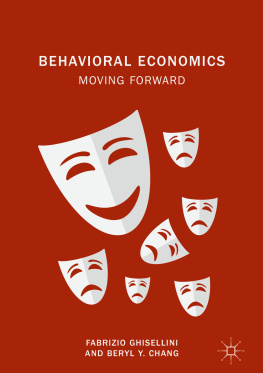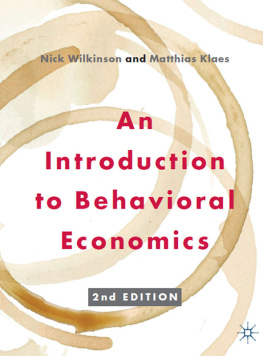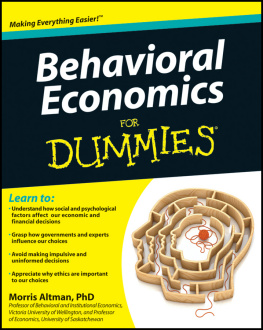Behavioral Economics
Over the last few decades behavioral economics has revolutionized the discipline. It has done so by putting the human back into economics, by recognizing that people sometimes make mistakes, care about others and are generally not as cold and calculating as economists have traditionally assumed. The results have been exciting and fascinating, and have fundamentally changed the way we look at economic behavior.
This textbook introduces all the key results and insights of behavioral economics to a student audience. Ideas such as mental accounting, prospect theory, present bias, inequality aversion and learning are explained in detail. These ideas are also applied in diverse settings such as auctions, stock market crashes, charitable donations and health care, to show why behavioral economics is crucial to understanding the world around us. Consideration is also given to what makes people happy, and how we can potentially nudge people to be happier.
This new edition contains expanded and updated coverage of contract theory, bargaining in the family, time and risk, and stochastic reference points, among other topics, to ensure that readers are kept up to speed with this fast-paced field. The companion website is also updated with a range of new questions and worked examples. This book remains the ideal introduction to behavioral economics for advanced undergraduate and graduate students.
Edward Cartwright is a Reader in Economics at the University of Kent, Canterbury, UK.
Routledge Advanced Texts in Economics and Finance
Culture and Economics
On Values, Economics and International Business
Eelke de Jong
Modern Public Economics, Second Edition
Raghbendra Jha
Introduction to Estimating Economic Models
Atsushi Maki
Advanced Econometric Theory
John Chipman
Behavioral Economics
Edward Cartwright
Essentials of Advanced Macroeconomic Theory
Ola Olsson
Behavioral Economics and Finance
Michelle Baddeley
Applied Health Economics, Second Edition
Andrew M. Jones, Nigel Rice, Teresa Bago dUva and Silvia Balia
Real Estate Economics
A Point to Point Handbook
Nicholas G. Pirounakis
Finance in Asia
Institutions, Regulation and Policy
Qiao Liu, Paul Lejot and Douglas Arner
Behavioral Economics, Second Edition
Edward Cartwright
Understanding Financial Risk Management
Angelo Corelli
Empirical Development Economics
Mns Sderbom and Francis Teal with Markus Eberhardt, Simon Quinn and Andrew Zeitlin
Strategic Entrepreneurial Finance
From Value Creation to Realization
Darek Klonowski
Computational Economics
A Concise Introduction
Oscar Afonso and Paulo Vasconcelos
Regional Economics, Second Edition
Roberta Capello
Game Theory and Exercises
Gisle Umbhauer
Innovation and Technology
Business and Economics Approaches
Nikos Vernardakis
Behavioral Economics, Third Edition
Edward Cartwright
Behavioral Economics
Third Edition
Edward Cartwright

Third edition published 2018
by Routledge
2 Park Square, Milton Park, Abingdon, Oxon, OX14 4RN
and by Routledge
711 Third Avenue, New York, NY 10017
Routledge is an imprint of the Taylor & Francis Group, an informa business
2018 Edward Cartwright
The right of Edward Cartwright to be identified as author of this work has been asserted by him in accordance with sections 77 and 78 of the Copyright, Designs and Patents Act 1988.
All rights reserved. No part of this book may be reprinted or reproduced or utilised in any form or by any electronic, mechanical, or other means, now known or hereafter invented, including photocopying and recording, or in any information storage or retrieval system, without permission in writing from the publishers.
Trademark notice: Product or corporate names may be trademarks or registered trademarks, and are used only for identification and explanation without intent to infringe.
First edition published by Routledge 2011
Second edition published by Routledge 2014
British Library Cataloguing-in-Publication Data
A catalogue record for this book is available from the British Library
Library of Congress Cataloging-in-Publication Data
Names: Cartwright, Edward, author.
Title: Behavioral economics / Edward Cartwright.
Description: 3rd Edition. | New York : Routledge, 2018. | Revised edition of the authors Behavioral economics, 2014. | Includes bibliographical references.
Identifiers: LCCN 2017037171 | ISBN 9781138097117 (hardback) | ISBN 9781138097124 (pbk.) | ISBN 9781315105079 (ebook)
Subjects: LCSH: EconomicsPsychological aspects.
Classification: LCC HB74.P8 C37 2018 | DDC 330.01/9dc23
LC record available at https://lccn.loc.gov/2017037171
ISBN: 978-1-138-09711-7 (hbk)
ISBN: 978-1-138-09712-4 (pbk)
ISBN: 978-1-315-10507-9 (ebk)
Typeset in Gill Sans
by Out of House Publishing
Visit the companion website: www.routledge.com/cw/cartwright
Dedicated to Anna, Darren, Sofie, Kerry and Robert
Contents
The first edition of this book came about from teaching a course called Strategy and games for first-year undergraduates. The idea of the course was to illustrate through classroom experiments some of the basic ideas of economics and game theory. In teaching that course my interest and knowledge of behavioral economics grew a lot; as did my frustration at the limited resources available to students wanting to learn more about this fascinating area of economics. Eventually, I decided it was time to write a book.
My basic objective when writing the book was to convey both the excitement and the importance of behavioral economics. I wanted to explain the basic principles, ideas and results of behavioral economics and show how fascinating they are. I also wanted to illustrate through applications why behavioral economics is fundamentally important in understanding the world around us. Finally, I wanted a book that was accessible to a general reader, not just those trained in economics and comfortable with algebra.
This third edition builds on the previous two. Behavioral economics is an evolving subject, and so there is always new material to add and updates to take note of. There are, for example, new sections on stochastic reference points and the relationship between risk and time preferences. New applications are also considered, including behavioral contract theory and bargaining in the family.
This book would not have been possible without those who have contributed to the literature on behavioral economics and given me such great material to work with. Particular thanks are due to those who made my job so easy by writing papers over many years that, when put together as a whole, gave very clear insights into economic behavior. I would also like to extend a sincere thanks to very many people who have given me useful feedback on the first two editions of the book. It is important to make clear, though, that the opinions expressed in this book are mine, and not necessarily those of the researchers whose work I refer to.
A lot of thanks is due to my wife, Anna, who has helped so much in writing this and the earlier editions of the book. On a personal level, she has been patient and supportive while I wrote them. On a practical level, she is my greatest critic, never happy until everything is explained as fully and clearly as possible; she is also a great source of new ideas and new ways of thinking about old ideas. I should also thank all the students and colleagues connected with the Strategy and Games course, for teaching me so much. Finally, I want to give a big thanks to Myrna Wooders, who, as well as being a fantastic person to know, has long been, and continues to be, a great inspiration and mentor.



